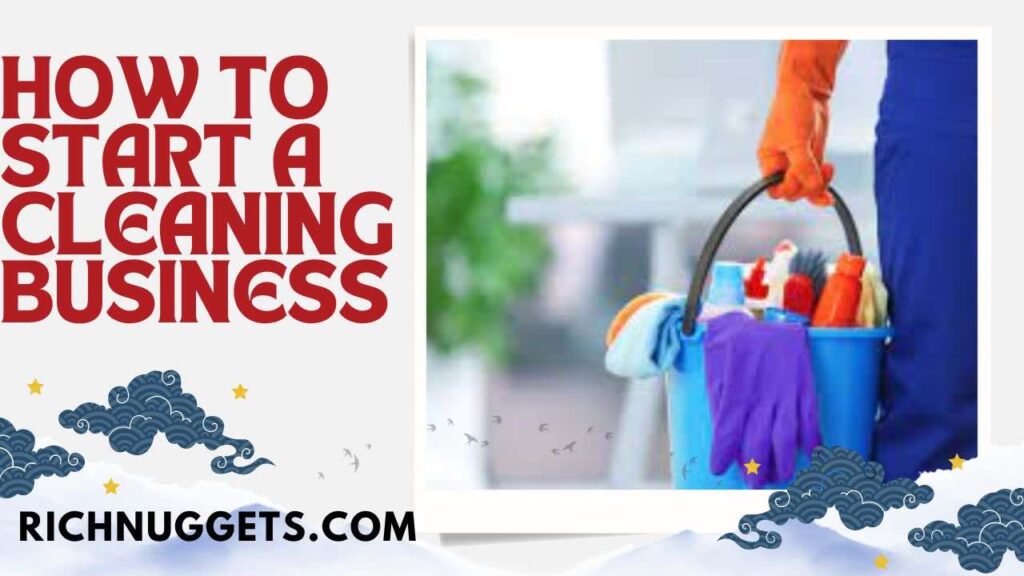This article is here to educate you on how to start a cleaning business that will be successful and become a household name just like Handmaid Cleaning

If you want to start a business with low costs, no typical expenses, and steady demand, consider a cleaning business.
Compared to other ventures, cleaning services have lower initial expenses. With little capital, you can quickly start operating, as long as you’re willing to work hard for modest profits and gradual growth.
For most cleaning jobs, you’ll only need basic household cleaning products, apart from some specialized chemicals and equipment.
You don’t need formal training or certifications for typical home and office cleaning, but that doesn’t mean the job is easy.
The fact that there’s a large market for domestic cleaners shows that it’s a demanding industry.
However, with a strong work ethic and excellent customer service skills, cleaning can be a profitable and fulfilling business.
Handmaid Cleaning, owned by Grace and Kevin Reynolds, began as a humble cleaning business with just a mop and a van. But, their determination and hard work have propelled them to build a nationally recognized brand.
You can follow in their footsteps, but it’s essential to start with proper organization.
This article will provide you with a comprehensive guide on how to establish and run a successful cleaning business that generates substantial income.
But before we dive right in on how to start a cleaning business, let’s look at a few things;
Table of Contents
How profitable is starting a cleaning business?
The cleaning business is very profitable and can give an average annual return of $56,000(USD) for a one-person cleaning business.
As the business expands, your potential earnings can reach approximately $100,000 per year. Nonetheless, the actual amount you earn from this cleaning business will be influenced by factors such as maintaining a stable customer base and efficient resource management.
How much money do you need to start a cleaning business?

Starting a cleaning business typically costs $2,000-6,000. Factors influencing this amount include:
- License and insurance: The structure of your company will determine how much you will spend on license/registration with fees ranging from $40-60 for individuals and $100-500 for LLCs. At the same time, insurance costs can vary from $550-3,500.
- Equipment: With $500 you can get the essential tools such as mops, brooms, disinfectants, and vacuums.
- Fleet: You can spend between $5,000-35,000 on the maintenance of vans. But depends on the number of vehicles you have at your disposal.
- Employees: Employee wages are a significant expense. Independent contractors usually charge $25-40 per hour, with varying rates depending on part-time or full-time employment.
- Marketing: Besides social media, startup marketing requires budgeting for a logo, website, and other branding materials.
How to Start a Cleaning Business
1. Market Research

When starting a cleaning business, research local competitors and their services. Identify additional services you can offer in the same market. Consider providing pricing incentives to attract repeat customers.
To gather insights, read Yelp and Google reviews to understand customer compliments and complaints. Address any market gaps by offering more flexible options based on customer preferences.
When determining the services to provide, it’s important to consider your specialization.
Not all cleaning services operate the same, and some businesses focus on specific types of cleaning.
Assess your abilities and identify the niche you can serve in your community. Here are a few service options to consider:
- Carpet cleaning or floor waxing services.
- Window washing services.
- Janitorial services.
- Private residence maid services.
- Organic cleaning services.
2. Define your cleaning business
Based on your market research, you need to determine the focus of your business. Assess the demand for commercial and residential services in your area and identify areas with less competition. Your decision will dictate the required training and insurance coverage, so choose wisely.
Residential Cleaning Services
This type of cleaning service involves working in people’s homes or residential spaces. Clients typically provide specific instructions, as it is their personal space.
Cleaners should possess adaptability and respect to fulfill the client’s needs.
Attention to detail is crucial in residential cleaning, as cleaners need to consider the arrangement of rooms.
Cleaning residential spaces often takes longer due to these details. Consequently, higher rates may be necessary to compensate for lower business volume throughout the day.
Commercial Cleaning Services
A commercial cleaning business caters to large spaces such as offices, hospitals, schools, and retail storefronts.
These businesses require janitorial services to maintain cleanliness and order, allowing smooth movement within the premises.
Specialized equipment may be necessary for cleaning such spaces. Working overnight might be required to avoid disrupting the company’s daily operations.
It is important to provide training and certifications, especially for locations that deal with biohazards or sterile environments.
Having a well-trained and professional team is crucial for successful commercial cleaning. Establishing a regular routine and ensuring expertise in cleaning procedures are essential.
In addition, as a commercial cleaning service, you can choose to either run a generalized or specialized service. For instance, you can choose to specialize your cleaning services only to schools, hospitals, or any industry of your choice.
3. Selecting a Brand Name for Your Cleaning Company

Establishing a brand is crucial for any new cleaning business. Choosing a brand name can be an enjoyable aspect of owning a cleaning business.
You can opt for a wordplay, incorporate your name, use a quirky or fun nickname, or focus on your location or the specific type of cleaning services you provide, such as residential or commercial cleaning.
When choosing a business name, consider the following:
- Clearly represents the company
- Easy to spell and remember
- Not already in use
- Sounds appealing and reads well
- Has potential for growth
While deciding on a name, conduct online searches to ensure the names you like are not already taken. Identifying any conflicts with existing businesses early on is essential. Unintentionally using another company’s name can lead to legal issues and associated costs.
4. Register and License your Cleaning Company
After deciding on a business name, it is important to register it to prevent others from using it.
The specific requirements for registration may vary depending on your state and local legislation, so ensure compliance with local business ordinances.
Obtaining a license and permits for your cleaning business is essential, particularly if you operate under a name other than your own. And depending on state laws and local regulations, you may need to apply for a business license and pay a fee.
Two common options for business licensing are;
- Limited Liability Company (LLC)
- Sole proprietorship.
An LLC reduces individual liability by placing company assets at risk. On the other hand, a sole proprietorship is generally more cost-effective and offers complete control over the business. However, if the business fails to generate profits, personal assets may be at risk.
If you choose a brand name for your cleaning company, you will also need to file a DBA (Doing Business As) license.
This license establishes your fictitious business name and ensures the legitimacy of your operations.
Additionally, it is crucial to determine whether local laws require business insurance, liability insurance, or other forms of protection.
Since working in clients’ homes may involve certain risks, having business insurance can safeguard both you and your clients in case of unexpected incidents.
5. Set pricing
Before starting a cleaning business, it’s important to conduct research and determine the pricing strategies of competitors in your area. Setting appropriate pricing is crucial to avoid losing potential clients by overcharging or undervaluing your services.
Contact local cleaning services to inquire about their pricing models and rates. While some cleaning services charge hourly, others consider factors like the number of rooms or square footage.
But generally, when establishing rates for a cleaning business, there are three main methods used: hourly, flat rate, and square footage calculation. Both hourly and flat rates can be used for both commercial and residential cleaning.
But for residential homes, it is often advisable, to begin with an hourly rate and then determine a flat rate based on the average time it takes your cleaners to complete a single-family home.
On the other hand, square footage calculation is commonly employed by commercial cleaning businesses. Given the repetitive and regular nature of commercial cleaning, it is practical to base the rates on the size of the space and the amount of labor required.
So, consider the nature of the cleaning service and choose the most appropriate rate-setting method that aligns with your business model and provides fair compensation for your services.
You can use the table below to get an overview of how to charge hourly;
| FACTOR | RATE | PRICE |
|---|---|---|
| Hourly rate | 1 hour | $25 |
| Time to complete job | 4 hours | $100 |
| Tax liabilities | 30 percent | $130 |
| Supplies | 5 percent | $136.50 |
| Overheads | 25 percent | $170.63 |
| Markup | 33 percent | $226.94 |
6. Finance your cleaning business
To finance your cleaning business, it is ideal to utilize personal funds to avoid debt, although this may not be feasible if you require vehicles or a physical location.
Please note that in the event of business failure, you will remain accountable for repaying any debts that were accumulated.
Consider the following funding options for starting your cleaning business:
1. Personal funds: If possible, use your own funds to start the business. Prior to utilizing personal funds, transfer the money into a designated business bank account.
2. Crowdfunding: It is an often overlooked method that enables you to gather funds from potential customers, including friends and family, prior to starting your business. Utilize these funds to acquire equipment and provide prepaid services.
3. Credit cards: While not recommended to accumulate significant debt, using a credit card can be an option. Look for cards with a 0% introductory APR for a period of 12 to 18 months, especially if you have good credit.
4. Personal loan: It is generally not recommended to obtain a personal loan for initiating a cleaning business because of the higher interest rates associated with such loans, as they are typically unsecured.
5. Home equity loan: If you possess equity in your home, you may explore the possibility of obtaining a loan using it as collateral. This alternative typically provides lower interest rates.
6. Rollover for Business Startups (ROBS): ROBS involves using funds from your 401(k) to establish a business. It is a complex and potentially risky option, so careful consideration is necessary. Additionally, it is only available for entities organized as a C corporation (C-corp).
Note that traditional bank loans or Small Business Administration (SBA) loans usually require at least three years of financial history or paid-off equipment, making them less suitable for startups.
However, if you are franchising, a bank loan or franchise financing may be available through the franchise’s established banking relationships, especially if the franchise has a low failure rate.
Carefully evaluate each funding option based on your specific circumstances and business goals.
7. Market Your New Cleaning Business
To achieve success in your cleaning business, it is vital to establish and sustain a strong client base.
Having a carefully planned marketing strategy is crucial to attract customers.
Here are some strategies to consider as your cleaning business grows:
Create a professional website:
Establish a simple yet informative website for your cleaning company.
Make sure to include information about the services you provide, your target audience, and offer convenient contact options for potential customers.
Register on Google Business Profile:
Take advantage of Google Business Profile (formerly “Google My Business”) to increase visibility on Google Search and Maps.
This free tool helps people find your cleaning business when they search for cleaning companies in your area.
Directly approach potential clients:
Identify companies or homeowners who could benefit from your cleaning services and reach out to them directly.
This proactive approach allows you to introduce your business to new prospects, establish connections within your local community, and acquire clients who may not have found you otherwise.
Advertise in the community:
Consider posting flyers in strategic locations around your town to catch the attention of potential clients.
Additionally, explore opportunities to advertise your business through local community boards, your Chamber of Commerce, or local media platforms such as newspapers, news networks, or radio stations.
Utilize social media:
Leverage the power of social media platforms to promote your cleaning business. Share valuable information, updates on availability, and provide a glimpse into your business operations.
Social media advertising options can also help you target specific groups of potential customers.
Earn referrals:
Word-of-mouth recommendations are invaluable for attracting new clients. Encourage satisfied customers to refer your cleaning services to others.
If you are just starting, offer your cleaning services to friends and family and request them to spread the word about your business.
Remember to provide exceptional service to clients, exceeding their expectations, which increases the likelihood of receiving positive testimonials and referrals.
By implementing these marketing strategies, you can effectively promote your cleaning business and foster its growth.
Key Resources
- How to Start a Business in 11 Simple Steps
- How to Start a Small Business
- 27 Easy Thriving Business Ideas for Women
- Best 30 Low-cost Business Ideas with high profit
Conclusion
Launching a cleaning business is a wise decision due to its advantages of low overhead, minimal operating costs, and constant demand.
Compared to other industries, a cleaning business has the potential to generate profits relatively quickly. But, it’s crucial to effectively manage your supply inventory and employees to ensure smooth operations and continued success.
I hope you got value from this article, and your question on how to start a cleaning business has been answered❓
If you have any questions or contributions, leave them in the comment section below.
Remember to turn on the Bell 🔔 Notification icon to get notified when new articles are being published.





